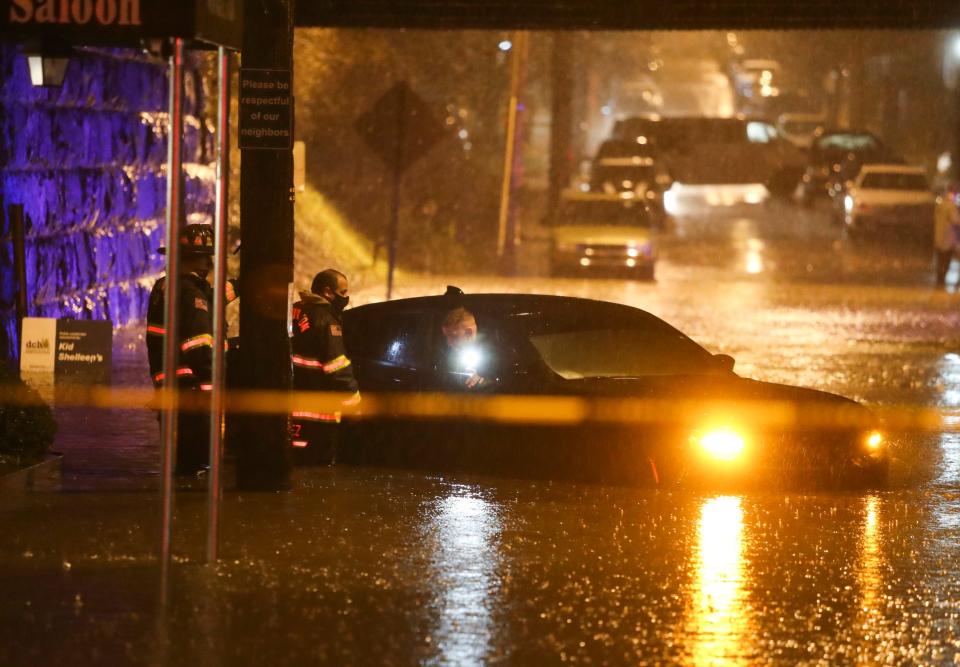With 'major' flooding expected in many Delaware coastal areas, here's how to remain safe
As heavy winds and rain are expected to hit the region beginning Friday night, the National Weather Service is predicting "major" flooding along much of Delaware's coastline.
In a Friday morning storm briefing, the agency warned that "widespread coastal flooding, strong to damaging winds and locally heavy rain are expected."
The worst flooding in Delaware is expected along the Atlantic coast, stretching from Sussex County to southern New Castle County. A National Weather Service map shows the "major" flooding designation reaching about the Smyrna area.

Though most of New Castle County likely won't see the worst flooding, the agency said residents will likely still see some. There's also a "slight" risk of flash flooding due to heavy rainfall.
Flooding do's and don'ts:
Even without tropical storm conditions, certain areas of Delaware are prone to flooding during periods of heavy rain. This has long resulted in fire department rescues of motorists who either don't realize how deep the water is or who believe their car can get through.
But the U.S. Department of Homeland Security warns that even 6 inches of water can knock a person down, and just a foot of moving water can sweep vehicles away.
Avoid flooded areas
Residents should never try to walk, swim or drive through flooded areas.
Additionally, residents should stay off bridges over fast-moving water as creeks and rivers can rise rapidly and wash away bridges with almost no warning.
Stay inside your vehicle, if possible
If a person is trapped in their car during flooding, they should remain inside − unless water begins to rise on the inside. If that's the case, get to the roof.
The Department of Homeland Security also stresses that motorists should never drive around barricades. While this may seem obvious, across the country, drivers routinely disregard safeguards that officials have put in place and thus put themselves and first responders in danger.
Move to higher ground
The agency also stresses that if a home becomes flooded, residents should get to higher floors. There is always a risk of electrocution when water meets electrical items, so residents should stay away from equipment if it's wet or if they are standing in water.
If possible, it's recommended to turn off the electricity.
Watch out for debris, unwanted visitors
Once flood waters have subsided in a home, residents should be wary of what might have been brought inside, including unwanted visitors such as snakes or other animals. If attempting cleanup, the federal government recommends wearing heavy work gloves, protective clothing and boots.
Moderate to major coastal flooding is forecast with the afternoon & evening high tide on Saturday. If you have interests in low-lying areas near the immediate coast, now is the time to be prepared. See the forecast here at specific points: https://t.co/421RYHz8VX pic.twitter.com/gnsN9vLS9g
— NWS Mount Holly (@NWS_MountHolly) September 22, 2023
Though flooding may recede from a home, that doesn't mean outside areas will also be dry. Residents should avoid wading in floodwater, which can be contaminated and have hidden debris or other items (though unlike in Southern states, Delawareans typically don't have to worry about creatures like alligators swimming around).
Still, underground or downed power lines can electrically charge the water, creating an electrocution risk.
Additionally, residents should use generators or other gasoline-powered machinery only outdoors and away from windows to prevent the possibility of carbon monoxide poisoning.
Pay attention to warnings
Finally, residents should always heed warnings from local officials and follow the recommendations of public safety personnel who are typically better trained for emergencies than the average resident.
For more information and tips, visit ready.gov/floods.
WHAT YOU NEED TO KNOW: Potential tropical storm causes coastal flood warning for southern Delaware, New Jersey
Got a tip? Send to Isabel Hughes at ihughes@delawareonline.com or 302-324-2785. For all things breaking news, follow her on Twitter at @izzihughes_
This article originally appeared on Delaware News Journal: Tropical storm to bring coast flooding to Delaware. How to stay safe

